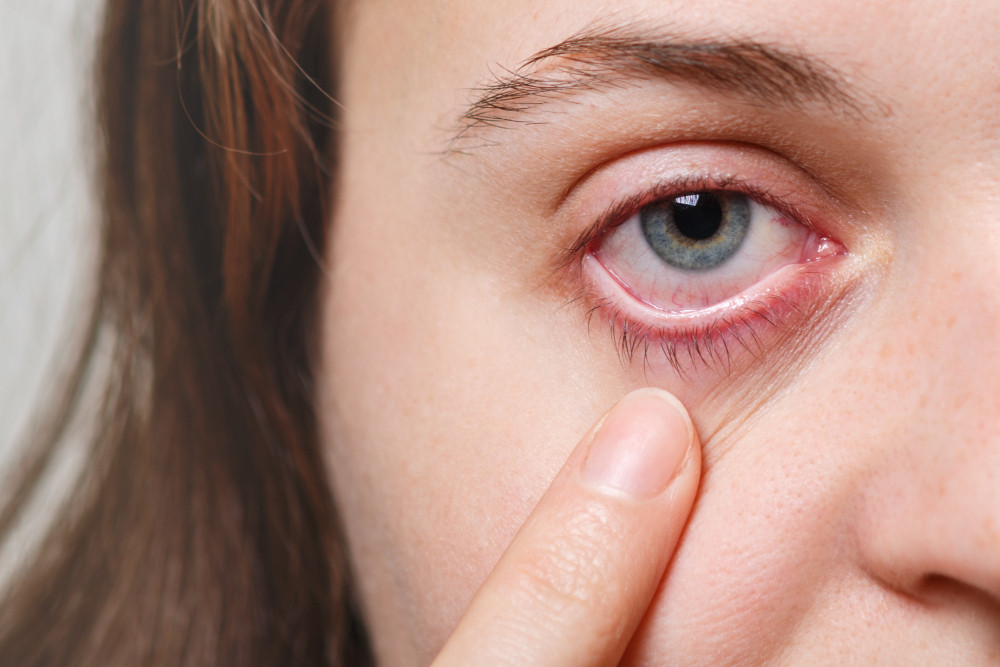Yawning is a natural response in people, often triggered by feelings of tiredness or drowsiness. While the exact cause of yawning is still uncertain, it is generally linked to signals from the body that help promote alertness when fatigue sets in.
In some individuals, yawning is also accompanied by tears. But what exactly causes this? Read on to learn more.
Reasons Why Eyes Water While Yawning
Yawning is a typical human behavior, though the precise reasons behind yawning are not fully understood. People tend to yawn when they feel sleepy, bored, stressed, or when waking up. Interestingly, yawning can even be "contagious" — simply seeing or hearing someone yawn might prompt you to do the same.
Yawning can sometimes provide a sense of relief and temporarily boost alertness. When holding back a yawn, tears may be released due to facial muscle tension and slight squinting, which can stimulate tear production.
If yawning frequently causes watery eyes, this could be linked to dry eyes, allergies, or other factors affecting tear production. According to Healthline, several factors may cause watery eyes when yawning, such as:
Cooling the Brain
Some researchers suggest that yawning serves to cool down the brain. It’s thought that the tears produced may play a role in dispersing heat from the skull, potentially aiding in brain temperature regulation.
Facial Muscle Pressure
Yawning involves contracting several facial muscles, including those around the eyes. This action exerts pressure on the tear glands, causing tears to form. People prone to watery eyes may notice more tears while yawning due to this added pressure.
Dry Eye Syndrome
Dry eyes may also be a reason for watery eyes during yawning. When the eyes lack adequate lubrication, yawning can lead to tearing. Dry eye syndrome may arise due to factors like:
- Cold or dry climates
- Air from fans or air conditioners
- Dust, fragrances, or aerosols
- Allergic reactions
- Conjunctivitis
- Styes
- Scratches on the cornea
Other Reasons for Watery Eyes
Various factors can lead to watery eyes. In infants and young children, a common cause is a blocked tear duct, which may remain undeveloped for the first few months after birth.
In adults, persistent watery eyes can result from eyelid skin that has loosened with age, which may interfere with tear drainage into the nasal passages. Excessive tear production can also result from eye irritation due to foreign particles or surface dryness.
Other potential causes of watery eyes include:
- Chemotherapy medications
- Eye drops
- Blepharitis (eyelid inflammation)
- Cold symptoms
- Allergic rhinitis
- Trichiasis (ingrown eyelashes)
- Keratitis (corneal inflammation)
- Conjunctivitis (pink eye)
- Styes
- Tumors impacting tear drainage
In most cases, watery eyes are not a severe issue and may not require treatment. However, consulting a doctor is advisable if you have excessive tearing that persists, or if you experience additional symptoms, such as:
- Vision loss or changes
- Eye injuries or abrasions
- Chemical exposure to the eye
- Eye discharge or bleeding
- Foreign object in the eye
- Redness, swelling, or pain in the eye
- Unexplained bruising
- Pain around the nose or sinuses
If you have concerns about your eye health, consult an eye specialist or use the AI Care app’s consultation feature, available on the App Store and Play Store.
Looking for more health tips, first-aid advice, or home remedies? Click here!
- dr Nadia Opmalina
Villines, Z. (2021). Why does yawning cause watery eyes?. Available from: https://www.medicalnewstoday.com/articles/why-do-my-eyes-water-when-i-yawn#
Pietrangelo, A. (2021). Why We Tear Up When Yawning. Available from: https://www.healthline.com/health/why-do-my-eyes-water-when-i-yawn
Petrangeloo, A. (2023). Why Are My Eyes Watering?. Available from: https://www.healthline.com/health/watery-eyes
Mayo Clinic. Watery Eyes. Available from: https://www.mayoclinic.org/symptoms/watery-eyes/basics/causes/sym-20050821












